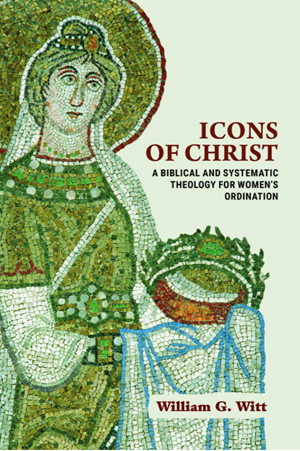4 Bad Arguments about Women's Ordination

Questions:
Which of the following four arguments do you hear the most often?
Which of these do you think actually “works” in your context?
The ordination of women, or the non-ordination of women, must be waged on theological and biblical grounds. Not on stereotypes, not on gender essentialism, not on social constructs, and not on constitutional grounds.
Which is why William Witt opens his book, Icons of Christ, with four very common non-theological and non-biblical arguments waged from either side. The book is worth the price just for this condensed chapter.
Mastery of this chp alone will thwart many an argument, and turn the debate into a conversation about legitimate arguments. (I could hope.)
Here they are, and the bold font is mine.
(1) The “Liberal Theology” Argument: the ordination of women is inherently and irrevocably connected to a theologically liberal and secularist agenda; the practice of ordaining women was introduced into the church by liberal theologians. The ordination of women is part of this secularist egalitarian agenda, and those in favor of women’s liberation share these secularist assumptions. So-called “orthodox” advocates for women’s ordination “stand on the shoulders” of these radical liberals, and ultimately share the same questionable egalitarian assumptions. There is also an inherent connection, the argument continues, between the ordination of women and the ordination of practicing homosexuals.
Thus, it’s from liberals, liberals are bad, therefore it is bad. Try that for any number of topics, like slavery or civil rights.
As another example, many who argued for civil rights for racial minorities in the 1960s were also theological liberals, but it does not therefore follow that to be in favor of civil liberties for racial minorities will inevitably lead to liberal
It is a (sad) reality in the history of the chuch that many expressions of freedom or liberty took a long time to be seen and established. Luther loved liberty but was quite narrow at times in his sense of liberty, and his narrows have been knocked down. Liberty is not just spiritual; it is social, too.
In the light of these advances beyond the limitations of Luther’s understanding of Christian liberty, it is evident that in the last several hundred years Christians have come to recognize that the notions of Christian liberty and equality have implications not only for salvation, but for socialliberty as well, including freedom of one’s person, freedom in the work place, racial equality, and, finally, equality between the sexes. It is this notion of Christian freedom and equality that is the impetus for a properly orthodox case for women’s ordination, and not a secularist notion of egalitarianism.
Behind the secularist agenda then has often been a Christian impulse!
(2) The Argument from “Consequences”: the ordination of women leads inevitably to the collapse of orthodox theology; the practice of ordaining women was the beginning of the collapse of orthodoxy in the mainline churches. A key question is whether women’s ordination has caused more harm than good to the church. Wherever women have been ordained, theological compromise has followed.
The above observation is a misleading one.

Witt pushes this one into a corner. The problem here is not women as women but specific forms of theology.
A more helpful question would be: has the ordination of women of orthodox theological convictions been (on the whole) a blessing or curse for the church? Women with orthodox theological convictions would be those women who practice ministry in the church, proclaiming the Word and administering the sacraments, who teach at or are students at numerous seminaries, who gladly embrace every article of the Creed, and affirm without hesitation the authority of Scripture, but differ on the particular question of women's ordination. Equating such women with liberal Protestants is as unfair as equating a biblical scholar like N. T. Wright with Bishop John Spong [because they are Episcopalians or Anglicans].
The consequences argument I have heard so often as a slippery slope, and Wayne Grudem may be the biggest proponent of this. And thus the most wrong.
This next one is the one I hear often:
(3) The Argument from “Rights”: the demand for women’s ordination that ordination is a matter of justice, a “right” to be ordained. Ordination is not about “rights.” No one has a “right” to be ordained.Those who advocate women’s or-dination are appealing to a language of individual “rights" that is incompatible with Christian orthodoxy.
Witt is right; it’s not about rights.
The question of a “right” to ordination is a fallacy of ambiguity. Certainly, no individual as an individual has a “right” to ordination. However, this applies to men as well as women.
His next line is one of his most significant:
The proper theological question has to do with whether the church should refuse ordination to a particular group of human beings as a class simply because they belong to that class. Arguments must be made as to whether women as a class cannot be properly ordained. Whether such arguments are valid is the crucial issue. Pointing out that no individual as an individual has a right to be ordained is a red herring.
Here’s his fourth:
(4) The Argument from “Discrimination”: the church rightly “discriminates” against certain classes of people in the matter of ordination. Unbelievers cannot be ordained. The mentally defective or the insane cannot be ordained. Practicing homosexuals cannot be ordained. Children cannot be ordained. That women as a class cannot be ordained is no more problematic than that these classes cannot be ordained.
So, if discrimination is OK at times, it can be OK with women. Nope:
To the contrary, none of these are cases of discrimination against a class of human beings simply because they belong to that particular class.
These are arguments about some defect and defects can be remedied.
One of the most important elements of Witt’s book is a historical truth-telling theme. Here it is in brief:
And, again, historically, the argument against the ordination of women was just such an argument based on a perceived inherent defect: women could not be ordained because of a lack of intelligence, emotional instability, and susceptibility to (particularly sexual) temptation.
This means the case against women is a case against a class of people (women) because women are defective. I used to hear this argument from Grudem based on “weaker vessel” and the like, but I don’t hear it as often today. Do you?
Here is Witt’s response:
The prohibition against the ordination of women would seem to be the only case in which the church discriminates against a particular class of people solely because they belong to that class. They are not discriminated against because of an incapacity. Women can preach. They can provide pastoral leadership. There is nothing either in their capacity to inform intentions or physical limitations that would prevent them from celebrating the sacraments. The presumption against women’s ordination is not then based on a moral disqualification or physical impairment.
Here it is then:
It is a discrimination against women as a class simply because they belong to the class.
Jesus Creed is a part of CT's
Blog Forum. Support the work of CT.
Subscribe and get one year free.
The views of the blogger do not necessarily reflect those of Christianity Today.




















